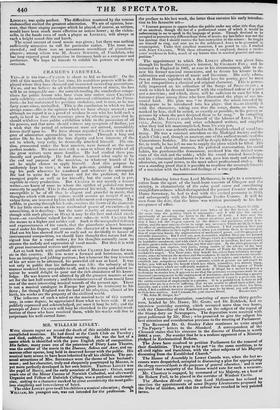The following letter from Lord Melbourne, in reply to a
communication from the agent of the band-loom weavers of Glasgow and the vicinity, is characteristic of the calm good sense and conciliating straightforwardness which distinguished the present Premier when, as Home Secretary, be had to deal with the excited peasantry in 1830, and subsequently with the Metropolitan Trades Unions. It will be seen from the date, that the latter was written previously to his last acceptance of office.
"South Street. Mardi 13, 1935.
" sir—I have this rimming received your letter or the flth in-taut, and, at the same time the petition which it announces ; and I will take the eariiest opportunity of presenting the hitter to the House of Lords. I have read the statements of your petition a; ith the utmost attention; and you will But doubt that I have felt the deepest concern for the distress and privations which it describes, aud the most anxious desire to adopt any measures which arc tikiy to have the effect of ameliorating the condition of the workmen. I feel convinced, that you trace these difficulties to tlwir right sources, when you attribute them to the competition of numerous hands, the, augmentation of mechanical power, and the progress of scientific discoveries. But I wish you, now, to consider. Mhether these are not natural causes, inherent in the very constitution of things, %Odell it is impossible to counteract by legislative enactment, awl with which it is imprudent to interfere. lest you should produce greater evils and miseries than any that now exist. In the sixth paragraph of your petition, you express, very justly, strong doubts of the efficacy of the very remedy for which you pray. viz., is fair trial of Boards of Trade for the regulation of workmen's wages. You there state, that benefit has arisen from voluntary arrangements. come to between the masters and the workmen. It surely deserves some consideration, whether this is not the best course which can be taken; and ts hether, if you establish, any compulsory control over contracts, which at present are and ought to Lie free, you will not lose the benefit which you think, yourselves, you already enjoy, and incur dangers which are sufficiently manifest. If. through the agency of Trade Hoards, you establish a rate of wages, and make it illegal for a master to give or a tradesman to receive less, it appears to me that the necessary cousegneuce must be an increased encouragement to the employment of machinery, and the throwing a greater number of hands out of work altogether. A reduced rate of stages is a great evil, but the entire cessation of employment is a greater. It is a painfirl task to have to tell persons who are in a state of suffering, that we are unable to afford them relief; but sincerity, and a wish to do you service, has induced me to write you these few lines, which. I feel confident, however disappointed you may be by them, you will attribute to their true motives. And I remain, Sir, your sincere friend, MELBOURNE." " Mr. John M. Gregor,
A very numerous deputation, consisting of more than thirty gentlemen, headed by Mr. Hume, Mr. Grote, and Dr. Birkbeck, had an interview yesterday morning, which occupied more than two hours, with the Chancellor of the Exchequer, on the subject of the repeal of the Stamp-duty on Newspapers. The deputation were received with great politeness by Mr. Rice ; who promised to give the subject his best attention and consideration previous to the meeting of Parliament.
The Reverend Mr. G. Stanley Faber continues to write stupid " No-Popery" letters to the Standard. A correspondent of the Chronicle states that his sinecure in the diocese of Durham is worth 3000/. a year. No wonder that he is a zealous opponent of a 31inistry pledged to Ecclesiastical Reform.
The Jews have resolved to petition Parliament for the removal of their disabilities. They pray to be put "in the same condition, as to all civil rights and franchises, with the other subjects of his Majesty dissenting from the Established Church."
The House of Assembly in Lower Canada was, when the last accounts were despatched, occupied in discussing a plan for appropriating the clergy reserved lands to the purposes of general education : and it was supposed that a majority of the House would vote for such a measure.
Mr. Chantrey is engaged, by command of his Majesty, en a bust of Sir Robert Peel, to be placed in the corridor of Windsor Castle.
The Aberdeen Herald says, that Lord Melbourne has refused to sanction the appointments of sonic Deputy Lieutenants proposed by the Duke of Gordon, and that the refusal was couched in very pointed terms.


























 Previous page
Previous page